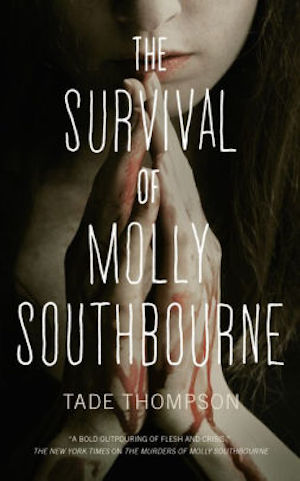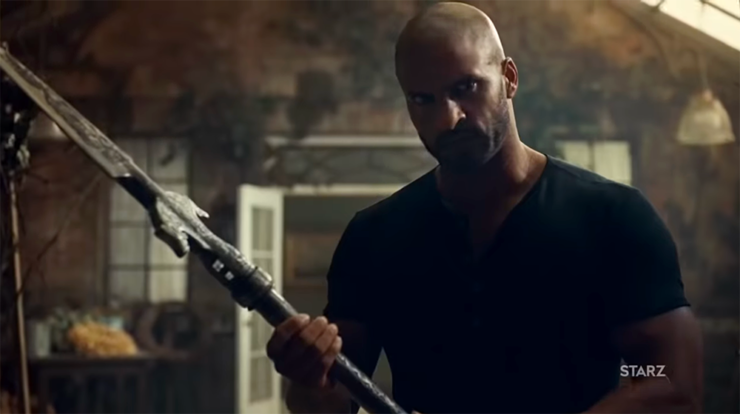Look, I didn’t love the second season of American Gods. I’m not even sure I liked it all that much. I definitely didn’t actively dislike it, although that’s not saying very much. The first three episodes of the second season were mostly disappointing, and the rest of the season is, with a few big exceptions, more of the same. Although there was much to enjoy—I want a whole webseries set at Al Grimnir’s Regius Theater—the overall experience was mediocre at best, and downright aggravating at worst.
Spoilers ahoy.
What American Gods does well is tell stories about stories. Quoth Mr. Ibis, “Stories are truer than the truth,” and that might as well be the show’s tagline. No “coming to America” opening tales this season means that all the stories-about-stories have to be inserted directly into the main narrative. With Wednesday, we have learned to expect a thick layer of lies with every “truth” he tells, but he’s also so good at telling stories that it can be near impossible to tell fact from fiction, for those on the receiving end. With a single story, modified for its audience, he can shatter a loving relationship between his own son and a weak American goddess, reshape that goddess’ role in American mythology, and (later) cause the irreversible death of his only child. The story Wednesday tells Shadow about why he needs him and what Shadow’s role is in the coming battle is just that: a story. There is truth and lies and obfuscations, but it is, in the end, a story Shadow is desperate to believe.
Mad Sweeney, too, is a man of stories, although he’s long since forgotten which are true and which are legend. Episode 7 fleshes out Mad Sweeney’s history—or, more accurately, histories. In Ireland, there are countless stories about how he came to be, and in America, even more so. Who he was and who he became are muddled and blurred. It’s no wonder he’s so much of a mess today. He is a man with too many stories and stories about stories. Where Wednesday weaves his tales in order to shape the world to his choosing, Mad Sweeney is suffocated by them. Although it ends in senseless tragedy, his episode is one of the best of the season. As frustrated as I am with Laura Moon’s thematic role this season, there’s no denying that she and Mad Sweeney have kept the show afloat largely through charm and humor. Without him, the show and other characters become a lot less interesting.
American Gods Season 2 wants to deal with racism in America, but it’s going about it the wrong way. First, it’s only interested in Black Americans in white America; other racial and ethnic groups do not get a seat at the racism conversation table this season. Without the opening stories about other cultures bringing their gods to the New World, we’ve lost a sense of the wider world and with it comes the loss of how those immigrant people find (or don’t find) their place in American society. The Season 1 execution of Mexican Jesus highlighted a bigger conversation on immigration, bigotry, hypocrisy, and religion. Season 2 only seems interested in other racial and ethnic groups when they can be useful to Mr. World or Wednesday. The struggles and sacrifices of the humans who worship these various gods doesn’t factor in.
Buy the Book


The Survival of Molly Southborne
Secondly, the show isn’t actually talking about racism, but rather focusing on inter-cultural conflict between African Americans. Nancy’s first season “Angry is good. Angry gets shit done,” soliloquy was about fighting back against oppression. Although he was preaching to Black Africans, there was fire and rage and passion for self embedded in every line. It was about taking back our power from those who would strip us of it. Season 2 tries and fails to strike lightning twice with a three-way debate between Mr. Ibis, Nancy, and Bilquis. On the surface it sounds like they’re talking about African American empowerment, but dig a bit deeper and it’s really just Nancy and Bilquis bickering over who gets Ruby Goodchild. It isn’t a discussion about surviving and resisting white patriarchy, but three Black people with conflicting opinions on respectability politics scrabbling over worship scraps.
Even worse is when Bilquis, an African goddess who has spent more than enough time living in America and being treated like and perceived as African American, brushes off Nancy’s anger with, “We have lived long enough to know these troubles are timeless.” It’s a helluva thing to put those specific words in that specific goddess’ mouth. Yes, slavery existed for most of human history. But the particular brand of slavery Nancy is referring to is uniquely American. It’s built into every layer of American history, from the Constitution to the Civil War to Civil Rights to Ferguson and beyond. And Bilquis knows that, or she should; if she doesn’t, that’s a whole different conversation we need to have.
We see this issue crop up again with William James, a real (non-fictional) man who was lynched and mutilated in Cairo in 1909. Season 1 stumbled with the symbolism when Technical Boy’s cronies lynched Shadow, and Season 2 tumbled right off the cliff with James’ execution. American Gods loves the grotesque and lurid, but the depiction of a real lynching shouldn’t be played for shock value and slo-mo bloodshed. That scene wasn’t about James but about what horrors white people inflict on Black people. Even worse, the writers took James’ dying rage and put it on the Black citizens of Cairo. No. Nope. Absolutely not. I don’t believe for a second that a man in James’ position would decide the people really at fault for his lynching were the African Americans forced to witness his torture.
Women also continue to fare poorly this season. New Media seems to exist to give the men around her something to bark or gawk at. Mr. World orders her around and she acquiesces without a second thought. Technical Boy snarls at her and she flirts and pouts. Bast comes out of hiding only to seduce Shadow. Laura, too, is tied wholly to men. She’s obsessed with Shadow. Mad Sweeney sends her to New Orleans. Baron Samedi gives her a potion in exchange for sex. Wednesday took her life then used her death to further his own mission. Not until the finale does she finally gain some agency, although most of her focus is still wrapped up in Wednesday.
Honestly, I’m not sure I want or need a Season 3. Without a showrunner with a spectacular visual style, an eye for on-screen talent, and a keen sense of storytelling, American Gods is doomed for mediocrity. Bryan Fuller and Michael Green set the gloriously bonkers tone of the first season, while the question driving Season 2 seems to be “how do we do this in a cheaper, less artistically interesting way that’s more in line with the book?” At this point, the only thing that can reel me in for another 8-10 hours of my life would be a great showrunner taking over. But is there anything left for them to salvage? I’m not entirely convinced that there is. That being said, Shadow’s Lakeside interlude was one of my favorite parts of the book and I have to admit that I’m still terribly curious about how it’s all going to play out…
Alex Brown is a high school librarian by day, local historian by night, author and writer by passion, and an ace/aro Black woman all the time. Keep up with her on Twitter and Insta, or follow along with her reading adventures on her blog.










